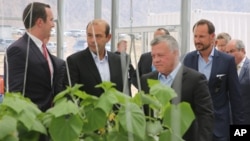Water-poor Jordan on Thursday launched a project using seawater to produce crops with clean energy.
Jordan's King Abdullah II and Crown Prince Haakon of Norway, which contributed most of the $3.7 million cost, inaugurated the facility in the kingdom's Red Sea port city of Aqaba.
Haakon told reporters he was "impressed by the way innovative ideas have been translated into a plant the size of four football fields.''
The facility, part of the Sahara Forest Project (SFP), produces "energy, freshwater and food and all this in an arid desert,'' he said.
The facility, surrounded by rocky desert, uses seawater to cool greenhouses. A solar-powered plant then desalinates the water for irrigation.
Inside the greenhouses, pesticide-free cucumbers flourish.
The project is set to produce 130 tons of vegetables a year and 10,000 liters of freshwater a day.
"This is just the start,'' said Joakim Hauge, head of SFP. He said the organization selected Jordan because it has the required abundance of sunlight and seawater.
Last month, a report by Stanford University suggested that Jordan, one of the world's driest countries, could face more severe droughts unless new technologies are applied in farming and other sectors.
"Future adaptation to extreme droughts in Jordan will be an immense challenge,'' said the report by the university's School of Earth Science. "The projected negative impacts of more severe droughts of greater duration calls for essential alternatives.''
Dry Jordan Launches Project to Grow Crops From Seawater
update

AQABA, JORDAN —



